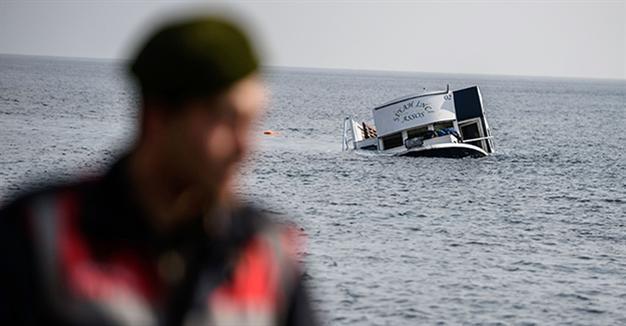Turkey detains human smugglers, stops 120 Syrians from sailing to Greece
İZMİR

A sinking boat is seen behind a Turkish gendarme off the coast of Çanakkale's Bademli district on January 30, 2016. AFP Photo
Turkish authorities on March 5 detained at least two human traffickers after they shuttled some 120 Syrian refugees to the Aegean coast as the country stepped up efforts to curb the flow of migrants to Europe.Gendarmes stopped the group, mostly made up of women and children, on a beach near a wooded area by the village of Bademli, located across from the Greek island of Lesbos, an eyewitness told Reuters.
The raid occurred on the eve of a summit in Brussels on March 7 at which Turkey and the EU agreed to tackle the migrant crisis together after more than a million people fleeing turmoil in the Middle East, Africa and Asia sought safety and prosperity in Europe in 2015.
Europe wants candidate country Turkey to step up security along its coast and take back migrants caught at sea to help reduce the flow of refugees to the EU. In exchange, it has pledged 3 billion euros ($3.3 billion) in funds to help Turkey with the 2.7 million Syrian refugees it hosts.
During the chase, at least one trafficker escaped on foot, while officers towed away half-dozen or so minibuses the smugglers had driven to the coast. The refugees, who included a pregnant women and newborns, were bussed back to the port city of Izmir.
One Syrian who appeared to be in his 30s said he was forced to attempt the route because of lack of opportunities in Turkey.
“It’s not bad here but there is no work. I have relatives in Germany and will go to be with them,” he said, declining to give his name.
Geographically located between war-torn Syria and Iraq in the southeast and the EU member states of Bulgaria and Greece in the northwest, Turkey has become a transition point for migrants looking to illegally cross into the EU, fleeing the violence in Iraq and Syria and seeking a higher standard of living.
The wave of migration across the Aegean Sea has often resulted in injuries and deaths due to either the capsizing of migrant-carrying boats or abuse of migrants by human traffickers.
















